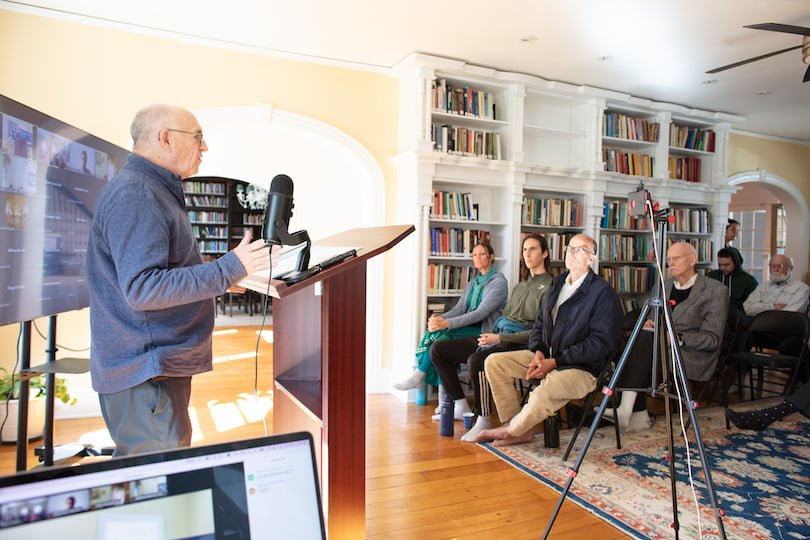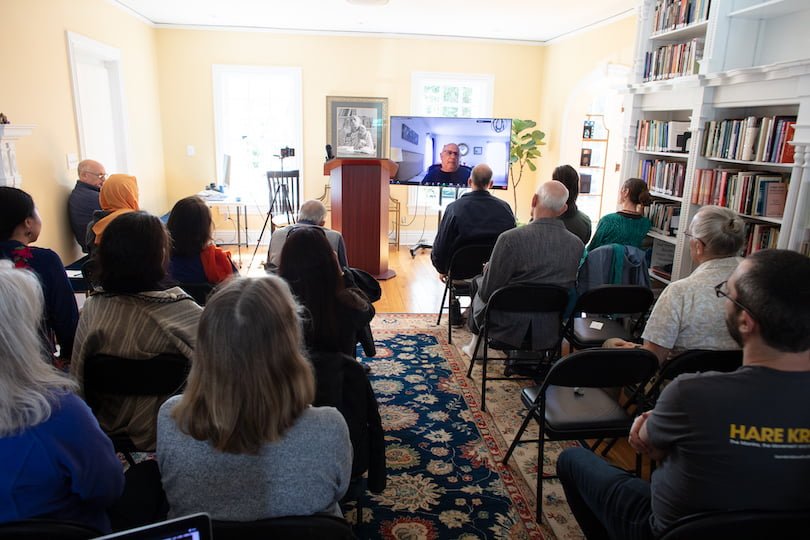Richard L. Thompson Lecture Series Inaugural Event
By BIHS | Мар 05, 2023

“The process of bhakti-yoga is regulated by a theory of knowledge that strictly
rules out unjustifiable speculation and extrapolation, and in this respect bhakti-yoga
is methodologically superior to modern science, and goes beyond modern science
by providing the individual with practical methods of developing higher
cognitive powers that lie dormant in the conscious self.”
(Mechanistic and Nonmechanistic Science, p. 10)
The Bhaktivedanta Institute for Higher Studies launched an ongoing lecture series based on the books of Richard L. Thompson (Sadaputa das, 1947-2008) with a hybrid (online/in-person) event at the BIHS Headquarters in Gainesville, FL, on February 4, 2023 (Sadaputa’s birthday!). Six of Thompson’s books will be covered chapter by chapter with a lecture summarizing the contents and highlighting the chapter’s essential messages, followed by a discussion session.
Three very special guest speakers opened the Series by offering their realizations concerning the impact of Sadaputa’s research, lectures, and publications on their personal life, and on both the devotional and scientific community.
Jayadvaita Swami (Jay Israel), who served as an editor for nearly all the books published by A.C. Bhaktivedanta Swami Prabhupada during His lifetime, focused on Thompson’s “wonderful fertility of mind and openness of thought” as he “set a direction and a high bar by his probing mind and probing intelligence.”Having worked closely with him for many years as an editor for Back to Godhead magazine, which featured over 40 articles by Thompson spanning three decades, Maharaja was keenly aware of his “gift for taking complex ideas and making them accessible to ordinary persons”:
Sadaputa stands out for his conviction that something is really being said here, Sukadeva Gosvami has something profound to say – not just a religious doctrine, or a Hindu belief, or traditional wisdom – but there’s deep substance to it.
While accessing the past and future impact of Thompson’s published material, Jayadvaita Swami praised his ability to understand “where were the opportunities for discourse,” and thus produce a legacy empowering future generations “to be able to look at Sadaputa’s work, and be informed by it, provoked by it, and guided by it. It is so valuable!”
Badrinarayan Swami (Robert Morrill), who has served as a Governing Body Commissioner since 1987, described his intimate dealings with Thompson during his tenure as Temple President in San Diego from 1978 to 1995. He remembers his “friend and hero, Sadaputa Prabhu, as a gentle, refined, and sophisticated person with an abiding sense of humor.” After relating several humorous anecdotes, Maharaja highlights Thompson’s sincerity: “He was absorbed in his service of presenting a scientific view of the Vedic understanding,” and was “very serious about his sadhana – he loved the morning program!”
Recalling one of their many philosophical discussions, Badrinarayan Swami explained how Thompson “deepened my faith in the Bhagavatam: if you accept the principle of a multi-dimensional universe, then the whole thing opens up and becomes plausible.” His closing words reveal an abiding appreciation of Thompson’s life’s work:
One cornerstone of Sadaputa’s approach to his studies – if something was in the Bhagavatam, he accepted a priori, axiomatically, that it was true. But his mission was to understand and share with others HOW it was true. And he gave his life to that mission. We can never repay Sadaputa. He’s one of my heroes, and one of our heroes.

As one of Sadaputa’s early and enthusiastic supporters, Hrdayananda Das Goswami, who received his PhD in Sanskrit & Indian Studies in 1996 from Harvard University and has authored numerous acclaimed books in his field, carefully outlined the importance of engaging Thompson’s legacy in contemporary discourse. Maharaja begins by referring to “Sadaputa’s unique and extraordinary corpus of literature on a Krishna conscious response to contemporary theories of science,” which he feels should be brought “to the attention of modern scholars.” While appreciating this inaugural Lecture Series event, he insisted that we must go further:
We are meeting here now to enthuse each other, to encourage each other, to enlighten each other so we all go out and make a greater contribution to the essential mission in which Sadaputa is such a superstar.
Hrdayananda applauded recent efforts of the Bhaktivedanta Institute to revitalize ISKCON’s intellectual pursuits and suggested that we can “truly honor Sadaputa by bringing him to the world’s attention in relevant ways, showing how his basic arguments stand the test of time” because he was “a true genius, a loyal friend, and a great devotee.”
Following these testimonies extolling the achievements of Richard Thompson, Brahmatirtha (Bob Cohen, BIHS Director), who was his close friend and colleague for over 30 years, initiated the Lecture Series by giving a summary of the Introduction to Thompson’s first book, Mechanistic and Nonmechanistic Science: An Investigation Into the Nature of Consciousness and Form (1981). He began the discussion with the book’s opening quote by John Maynard Smith (Evolutionary Biologist, FRS):
The individual is simply a device constructed by the genes to ensure the production of more genes like themselves.
The highlights of his detailed presentation include these main points:
- A mechanistic world implies that everything is a machine made of matter
- For biologists, this means that life developed from matter
- For psychologists, this suggests that the mind is nothing more than patterns of electrochemical interactions in the brain
- Therefore mechanistic theories provide no justification for any system of social values
- Since religion is the only source of moral values and of higher purpose, many people live in a divided house of faith and reason
Thompson proposes that a more unified and comprehensive worldview would have recognized these four conditions:
- Observations cannot always be represented in numerical form
- Absolute reality must have some aspect of personality
- An inclusive framework would disagree with the theories of modern science to some extent
- Such a theory must have a source in a person
The BIHS will continue the Lecture Series by going through Mechanistic and Nonmechanistic Science chapter by chapter on alternate Saturdays, beginning on February 18. Recordings of events and past lectures can be found on the BIHS YouTube page.
Пожалуйста, посетите BIHS Richard L. Thompson Lecture Series webpage for further details, including the full schedule for lectures on Mechanistic along with registration and ZOOM information.















